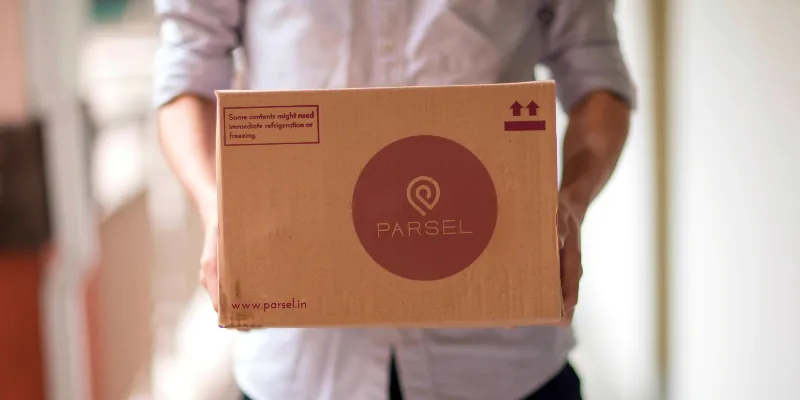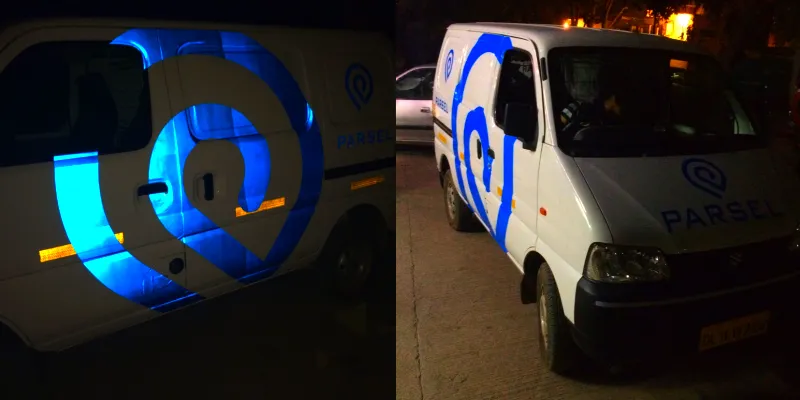How six-month-old logistics startup Parsel manages to clock 14,000 daily deliveries
When digitisation hit the shores, market trends shifted drastically, opening up a host of new avenues in the market. One such offshoot is e-commerce, as more and more businesses were conjured up, not just to enter the game by developing their own product, but to also curate and sell another’s. This has bolstered the role and importance of logistics in supply chain management(SCM). Parsel is one such company that anticipated the business potential of logistics.

Setting sails
This story is devoid of a Eureka moment, but, instead, has four 27-year-old B-school graduates doing meticulous research to find the gaping hole in the market and striking the iron when it is hot. Himanshu Meena and Rakesh KS were batchmates at IIM Bangalore and Akhil Sharma, who was Himanshu’s childhood buddy, had moved to England. While the former two were leading territorial sales and marketing teams respectively at different MNCs, Akhil graduated from University of Manchester and was designing iOS games that were topping global charts. Meanwhile, Ishan Modi was involved in his family's business in Gujarat after graduating from NMINS, Mumbai.
A call from Akhil, who expounded the huge wave of technology startups taking over US and Europe, and which was making its way to India, was the start. “We had many sit-downs and brainstorming sessions trying to figure out upcoming trends. We made a lot of research papersand created a database of all the startups in the market. The startups of the older generationused an inventory-based model. But, because of the tech revolution, people aggregate already existing inventory from other businesses. This e-commerce ecosystem was realising that logistics in SCM is vital to their business,” says Himanshu.
Akhil soon moved to India, and in June 2015, the four founded Parsel.

Logistics getting its due
Supply chain constitutes almost 10 to 15 percent of India’s GDP.Yet, logistics as an industry seemed like one of the most overlooked and highly under-utilised segment in the startup ecosystem. “Being the backbone of every startup and established business, solutions for improving the transportation and supply chain efficiency was a good challenge,” says Himanshu.
He explains that most startups in this space focus on one industry, whereas Parsel aims to be pan-industry, across all sectors like startups, corporate and retail. “In logistics, more than industry expertise, one needs adaptability. Each industry has varied requirements, so we knew we had to customise our offerings," he adds.
On the flexibility required, Himanshu elaborates:
An example of this would be to engage both bike and tempos for deliveries. This accounts for flexibility in the size of the goods to be delivered,owing to our broad spectrum of clients. We cater to e-commerce players like Flipkart, Amazon, Pepperfry; corporate clients like Subway, FedEx, Faasos, Hola Chef, iChef; and retail companies like ITC, Bisleri, and Mother Dairy.
Parsel helps companies make better utilisation of their assets, space and inventory. After a soft launch in Chawri Bazaar and other areas of New Delhi and NCR in July 2015, it started operations in Mumbai in September, doing 600 deliveries a day. The startup raised a Rs. four-crore seed round in August 2015from Nimir Mehta, Operational Advisor, CLSA Singapore.
As of December 2015, Parsel has been clocking 13,000 deliveries per day, with an average transaction size of Rs 100.
Challenges
A company that deals with clients as diverse as Parsel's can be expected to run into several challenges. “A retail client can be convinced in days, a startup in weeks, but a corporate one may take months,”Himanshu notes.
Corporates are set in their ways, with strong loyalties built with their partners over decades of association, socracking a deal with them requires a strong and customised pitch.
The typical local retail client is wary of adopting technologyand so it became necessary to walk them through the process.
With startups, Himanshu says that you will almost always incur a loss with them in the initial leg of your partnership, but they held on until the clouds cleared.
By tackling issues like poor Internet connectivity with SMS integration across metropolitan cities, battery consumption with battery saver apps, and delivery personnel'signorance of technology with clever single-touch UI, Parsel's technology adoption has become the backbone of its services.
With its sights set on a pan-Indian network, Parsel acquired courier company Accord Ecom, after whichit has already established operations in 10 Tier II cities.

YourStory’s take
An ever-expanding e-commerce space means that there is enough room for logistics startups to capture sufficient market share. But an expertise in client acquisition will only get one this far. Experts forsee a day when India will be clocking a demand for four to five million deliveries a day. At a time like that, the clear winners will be the ones with not just the largest network, but also the most innovative means of efficient delivery.
As companies like Ecom Express, Wow Express, Parsel and GoJavas have very clear value offerings for companies to ease the load off logistics and help them focus on their core product, roping in clients would be the easy part. Next up is sustenance- it will be their turn to utilise their domain expertise to optimise their core product too.







